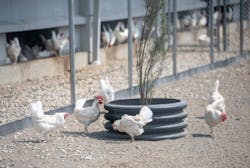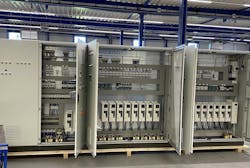Egg farming may be upstream for the food manufacturing industry, but it is a key link in the food supply chain that keeps food manufacturing running. And just like the manufacturers they supply, egg farms often rely on the same industrial automation technologies, such as drives, that help control operations in food manufacturing.
In the case of egg farming, better control of ventilation fans, pumps and conveyors saves energy, cuts waste and provides healthier and safer conditions for the chickens. All of these represent important steps towards more sustainable egg production, with ABB drives playing a crucial role.
MPS Egg Farms is a family-owned shell egg business operating seven farms in the United States. As one of the top ten egg producers in the USA, MPS Egg Farms aims to be the premier supplier of shell eggs by meeting the highest standards of customer service, quality, food safety and animal husbandry. With 14 million laying hens, MPS produces 9 million eggs and delivers an average of 24 truckloads of eggs every day to customers which include grocers, food distributors and food service companies across the country. Food safety standards and sustainable processes have a very high priority at MPS, with the objective of ensuring the best balance of quality, cost, environmental impact and secure supply.
Kipster concept
The Kipster concept for sustainable production of eggs, which originated in the Netherlands, focuses on achieving better animal welfare, reducing food waste and cutting carbon emissions to achieve carbon-neutral egg production. MPS decided to partner with Kipster to build four of their innovative hen houses in North Manchester, Indiana. The aim was to take further tangible steps towards reaching full carbon neutrality and circularity at its farm, while also making sure the chickens have a good life producing eggs.
To help achieve these aims, MPS worked with the Dutch system integrator Hotraco which has its headquarters in Horst, Netherlands and is known for implementing the Kipster concept. Hotraco specializes in designing, building and delivering motor-drive control solutions that manage and run ventilation, manure drying, feeding and egg conveyor operations on egg and broiler farms. For the MPS expansion at North Manchester, Hotraco installed advanced motor-drive control systems to run the 56 ventilator fans that move air and the 40 conveyor belts used to transport the eggs, chicken feed and manure waste.
84 ABB drives control the key processes
To achieve the precise and safe motor control needed to run these operations at the optimal speeds, Hotraco installed 84 units of ABB’s general purpose ACS580 variable frequency drives. The ACS580 drives give very accurate and energy efficient control of the speed and torque of the motors that run the fans and conveyors in the egg farm facilities of MPS.
Luca Coniglio, the global marketing manager at Hotraco Agri, explained the company and project background. “For 50 years, Hotraco has helped customers worldwide to better control their livestock farming, horticulture and storage processes by using our innovative automation systems. For the MPS project with the Kipster concept implementation, the ABB control systems were a key requirement that was specified by the end customer. This fact led to an efficient and fruitful collaboration between Hotraco and ABB which allowed us to create an optimal control solution for MPS for ventilation, egg collection and material conveying.”
Another important point is the security of fresh air supply and exhaust air handling, which can be critical both for animal welfare and for the safety of personnel. The high reliability of ABB drives is therefore appreciated for keeping the facilities well-ventilated and ensuring fresh, clean air circulation. For additional animal safety, the ABB drives offer automatic adaptation to a power mains failure. This means that if the power fails, the single-phase feature in the ABB drive still keeps fans and pumps in motion, reducing the risk of mortality.
Energy savings and operational reliability
Alex Bradford, lead electrician at MPS, said he can see that big savings have resulted since the ABB drives were installed. “Our first Kipster-type chicken house, which uses Hotraco controls and ABB ACS580 variable frequency drives, has just reached its one-year milestone. By using the energy efficiency calculators that are built into the ABB drives, we can see that over the last year we have saved nearly 400,000kW. This equates to roughly US$9,000 in annual savings. Although these numbers may be overstated, even if our actual savings are only half of those figures, it still adds up to several thousand kW and several thousand dollars saved per year.”
He added that another, and “potentially higher, cost saving benefit we believe we get from the variable frequency drives is lower wear and tear on the equipment and reduced maintenance labor costs. The drive’s slow start function is gentle on the motors and the associated equipment they are driving, allowing them to progressively ramp up to full running speeds. This procedure is almost always better for the longevity of any equipment.”
An associated advantage of the soft start/stop function in the ACS580 drive relates to the fragile eggs on the conveyor lines. The gentle control avoids sudden and rushed movements that could damage the shells of the eggs, which would then have to be thrown away, causing production and monetary losses.
ABB noted that its drives are easy to program and setup to manage many critical factors in poultry farming, including ensuring that fans used for ventilation always run properly. Any risk of them not doing so can result in health problems or even mortality among the chickens inside the farmhouses. As an example, ABB drives have auto derate functionalities built-in which slightly reduce the fan speed to keep it running during critical situations. This conserves energy in a safe way. The drive also handles harsh and corrosive environments like farmhouses thanks to the coating of the sensitive components. This helps ensure both reliable operation and equipment longevity which reduces costs. ABB drives can also mitigate harmonics which can be a nuisance, especially in poultry farms that may be connected to a weak power network.
Lei Gommers is ABB global business development manager for drives.
About the Author
Sign up for our eNewsletters
Get the latest news and updates

Leaders relevant to this article:


